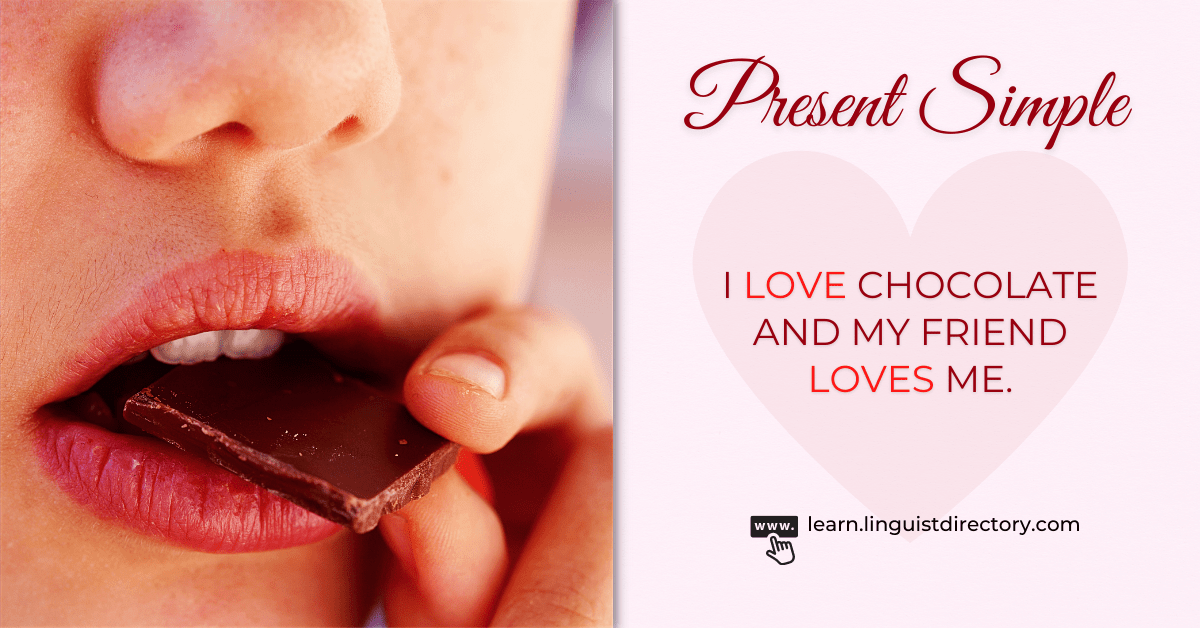
Present Simple
✅I like dark chocolate, but my friend likes milk chocolate.
We use the present simple:
- 1️⃣ to talk about something that is true in the present,
✅It’s Friday.
✅I love you.
- 2️⃣to talk about general facts that are always true and permanent (or we think that they are),
✅Two times two is four. (general fact)
✅Mount Everest is the highest mountain. (general fact)
✅Taylor Swift is the Queen of Pop. (opinion)
- 3️⃣to talk about regular or habitual events,
✅When I wake up, I brush my teeth. (habitual)
✅When I wake up, birds sing and the sun shines through my bedroom window. (regular)
✅Do you smoke? I don’t smoke anymore. (habitual)
- 4️⃣to talk about a timetable or a fixed plan,
✅My school starts at 9 am.
✅The train leaves at 8.20 am.
- 5️⃣to give instructions or directions,
✅Please finish this task and help Peter. (instructions)
✅Take the first left, then walk across the bridge. (directions)
- 6️⃣in the first and the zero conditionals.
✅(If/When) you come, we will play together.
✅(If/When) you touch snow, it melts.
| Subject | Auxiliary verb | Main verb | |||
|---|---|---|---|---|---|
| + | I, you, we, they | like | chocolate. | ||
| He, she, it | likes | chocolate. | |||
| – | I, you, we, they | do | not | like | chocolate. |
| He, she, it | does | not | like | chocolate. | |
| ? | Do | I, you, we, they | like | chocolate? | |
| Does | he, she, it | like | chocolate? |
Present simple positive
| Positive | Positive Short Form | Negative | Negative short form |
| I am | I‘m | I am not | I‘m not |
| you are | you‘re | you are not | you aren’t |
| he is | he‘s | he is not | he isn’t |
| she is | she‘s | she is not | she isn’t |
| it is | it‘s | it is not | it isn’t |
| we are | we‘re | we are not | we aren’t |
| they are | they‘re | they are not | they aren’t |
All other present simple verbs
| Positive
(he/she/it – add an extra ‘s’) | Positive Short Form
| Negative
(You only add ‘not’) | Negative short form
(Use don’t or doesn’t) |
| I like / I go | – | I do not go | I don’t go |
| you like / you go | – | you do not go | you don’t go |
| he likes / he goes | – | he does not go | he doesn’t go |
| she likes / she goes | – | she does not go | she doesn’t go |
| it likes / it goes | – | it does not go | it doesn’t go |
| we like / we go | – | we do not go | we don’t go |
| they like / they go | – | they do not go | they don’t go |
Present simple negative
✅I do not like this.
✅You do not like this.
✅ We do not like this.
✅He does not like this.
✅She does not like this.
The short form
✅I don’t know.
✅You don’t know.
✅They don’t know.
✅He doesn’t know.
✅ She doesn’t know.
Present simple questions
| Yes / No Questions |
|---|
| Am I? |
| Are you? |
| Is he? |
| Is she? |
| Is it? |
| Are we? |
| Are they? |
✅Do I like parties?
✅Do you like ice cream?
✅Do they know where to go?
✅Does he live far away?
✅Does she need our help?
✅Where do I live?
✅What time do you want me to be there?
✅When does she need to be back home?
✅Why do they travel by bus?
✅Who does she want to see?
✅How much does the ticket cost?
✅Who lives in Birmingham?
✅Who plays tennis every week?
✅Who is ready?
✅Where is your house?
✅What time is the party?
✅When is the next bank holiday?
✅Why is the window open?
✅How many people are there?https://youtu.be/cYuaQTUEoDo
